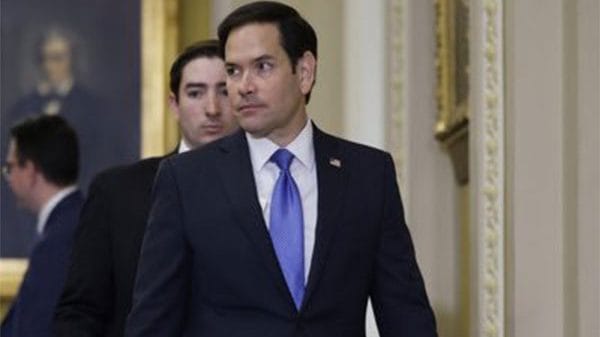New Delhi: US Secretary of State Marco Rubio will skip a G20 meeting later this month in South Africa, days after American President Donald Trump threatened to cut off funding to the nation, while his billionaire backer Elon Musk maintains it had enacted “racist” land laws.
The US administration opened a second front against South Africa over its new land reform law—one that allows for expropriation of land without compensation under specific circumstances—with Rubio writing on X: “I will NOT attend the G20 summit in Johannesburg. South Africa is doing very bad things. Expropriating private property.”
Rubio said his job was to advance America’s national interests, “not waste taxpayer money or coddle anti-Americanism”.
I will NOT attend the G20 summit in Johannesburg.
South Africa is doing very bad things. Expropriating private property. Using G20 to promote “solidarity, equality, & sustainability.” In other words: DEI and climate change.
My job is to advance America’s national interests, not…
— Secretary Marco Rubio (@SecRubio) February 5, 2025
Rubio’s decision to skip the foreign ministers’ meeting comes days after Trump claimed without offering any evidence that Pretoria–South Africa’s administrative capital–was “confiscating land” and “certain classes of people” were being treated badly.
South Africa President Cyril Ramaphosa, however, defended the land policy, saying his government had not confiscated any land and the policy was aimed at ensuring equitable public access to it. Ramaphosa said he was willing to discuss the issue with Trump, to help foster a better understanding of the new law, which was signed last month.
Ramaphosa’s party, the African National Congress (ANC), also pushed back against Trump’s comments, accusing him of amplifying misinformation promoted by AfriForum, a Right-wing lobbying group which supports the interests of the White Afrikaner community.
South Africa currently holds the Presidency of the G20–the multilateral economic forum consisting of the world’s largest economies, the European Union and the African Union. This is the fourth consecutive G20 to be hosted by an emerging economy, following Indonesia, India, and Brazil.
US President’s Trump’s comments mirror those made by tech giant and head of the newly birthed Department of Government Efficiency (DOGE), Elon Musk, who grew up in the African country while it was under apartheid. Musk has claimed the country had “openly racist land ownership laws”.
His messaging also came a few days before Israeli Prime Minister Benjamin Netanyahu’s visit to the White House. South Africa has been one of the leading critics of Tel Aviv’s war in Gaza and launched international legal action against Israel for its conduct of the war, labelling it genocide.
What is the new South African law
Ownership of land is extremely contentious in the African nation with roughly three-fourths of all freehold farmland being owned by the White population in the country. About 80 percent of the country is Black, while 8 percent is White.
Only around 4 percent of farmland is owned by Black landowners, according to reports. For decades, the country was ruled by a White minority population, which enforced the policy of apartheid, the policy of racial segregation and discrimination, which finally ended in the early 1990s, with Nelson Mandela winning the 1994 general election and coming to power as the first Black president of the country.
Over 30 years after the end of apartheid, the South African government finally signed into law its land reforms that replaced the 1975 Expropriation Act. The new law allows for expropriation of land without compensation under very narrow circumstances of “just and equitable and in public interest”. Under that definition, the land can be expropriated if it currently lay unused and there was no intention to make use of it in the future, or if the property proposed a risk to people.
The law further allows expropriation only if authorities have failed to reach an agreement with the landowner and it was in the public interest.
The law was enacted after over five years of consultations and the conclusions of a presidential panel, which was established to look into the issue. However, concerns surrounding land ownership have grown in recent years, especially with the slow pace of reforms in the last three decades. According to reports, there has been continued dominance of minority White landowners.
Starting from the middle of the 19th century, colonial settlers in the region that is now South Africa, slowly enacted laws to dispossess the local Africans of their land and expand White-owned farmlands. The pivotal law by the White colonialists was the Natives’ Land Act 27 of 1913, which prohibited Black South Africans from owning any land outside of the reserves set aside for them. The reserves for Black South Africans was a mere 7.3 percent of the total land in South Africa. The remaining roughly 92.7 per cent was reserved for the White minority.
In the early 20th century, the demand from the White farming community and burgeoning mining industry for cheap labour was another reason for the dispossession of land from Black Africans in the country.
In 2023, the US had committed roughly $440 million in aid to South Africa, of which around $315 million was to prevent HIV/AIDS. The US aid for HIV/AIDS accounted for around 17 percent of the entire programme, but Pretoria insists there are no other significant areas receiving American funding, according to Reuters.
(Edited by Tikli Basu)
Also read: G20 India leaders’ declaration nearly failed. A non-negotiable plan saved it: Amitabh Kant







The whites had built South Africa into a modern and progressive nation notwithstanding the apartheid.
Now that Mandela’s bunch of clowns are in charge, the country is falling apart.
South Africa is a classic case of the incompetent administration of the native people. The same would be seen in Australia, New Zealand, USA and Canada if political power was handed over to the native tribes of those lands.